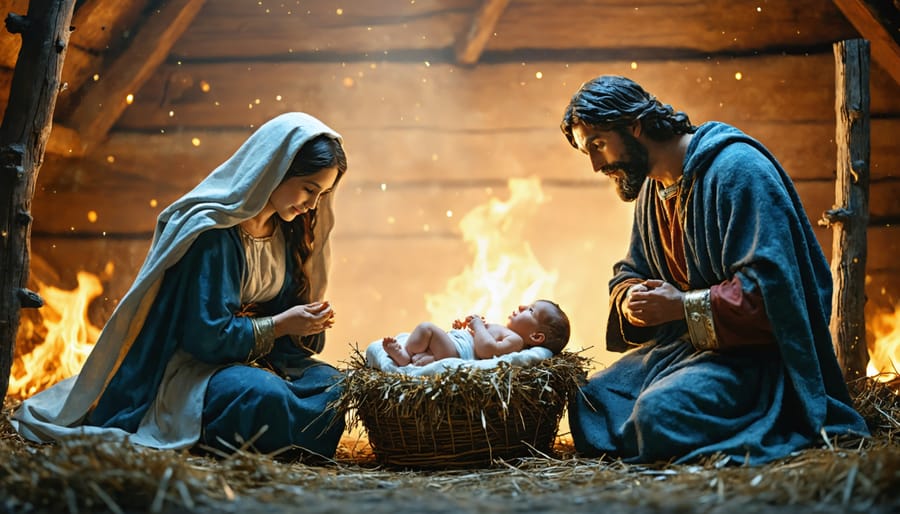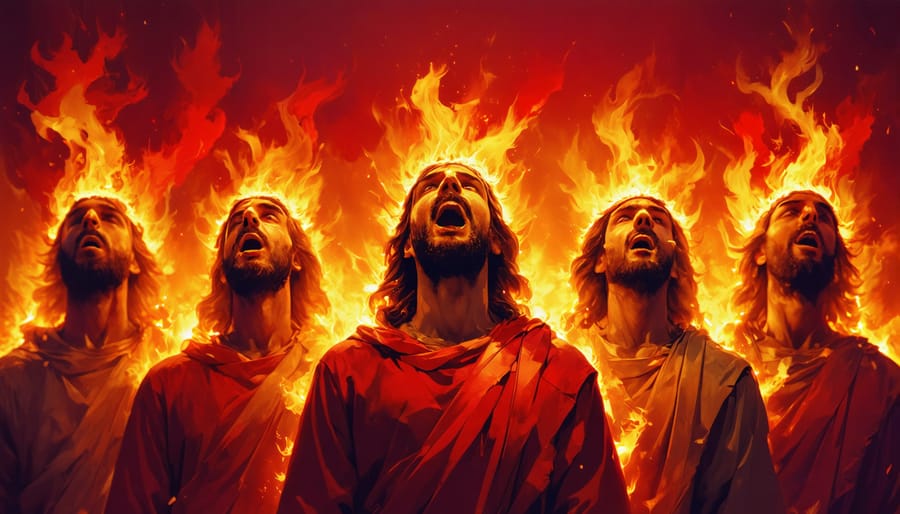The major festivals in Christianity are more than just celebrations – they are powerful reminders of God’s love, sacrifice, and triumph over sin and death. From the joy of Christmas to the solemnity of Good Friday and the hope of Easter, these Biblical festivals unite Christians around the world in remembrance of the key events in Jesus’ life. Each one invites us to reflect on the depths of our faith, renew our commitment to Christ, and rejoice in the eternal life He offers. As we gather with family and fellow believers to observe these sacred occasions, we have the opportunity to deepen our spiritual roots, strengthen our sense of community, and bear witness to the enduring truth and transformative power of the Gospel message. The major Christian festivals are truly a gift, guiding us ever closer to the heart of God.
Christmas

The Nativity Story
The Nativity story, as told in the Gospels of Matthew and Luke, recounts the miraculous birth of Jesus Christ. Mary, a virgin betrothed to Joseph, conceives a child by the power of the Holy Spirit. The couple travels to Bethlehem for a census, where Mary gives birth to Jesus in a humble stable. Angels announce the Savior’s birth to shepherds, who visit the newborn King. Wise men from the East, guided by a star, bring gifts of gold, frankincense, and myrrh to the child. The Nativity story reveals God’s love for humanity, as He sends His Son to be born in lowly circumstances, fully human yet fully divine. Through Jesus’ birth, God sets in motion His plan of salvation, offering hope and redemption to all who believe in Him. The Nativity serves as a powerful reminder of God’s faithfulness and the true reason for celebrating Christmas.
Christmas Traditions
Christmas is a time of joy, love, and celebration for Christians around the world. Many cherished Christmas traditions have deep spiritual roots. Attending church services on Christmas Eve or Christmas Day is a way to honor the birth of Jesus Christ, the reason for the season. Singing traditional carols like “Silent Night” or “Joy to the World” lifts hearts in worship. Nativity scenes displayed in homes or churches serve as visual reminders of the humble circumstances of Jesus’ birth in a manger. Exchanging gifts reflects God’s ultimate gift of His Son to humanity and the presents the wise men brought to the Christ child. Even festive meals and gatherings with loved ones echo the joy and fellowship of that first Christmas. While each family may have their own unique customs, the spiritual essence of Christmas traditions remains the same – celebrating Emmanuel, “God with us.”
Easter
Holy Week
Holy Week, the most solemn and significant period in the Christian calendar, begins with Palm Sunday, commemorating Jesus’ triumphal entry into Jerusalem (Matthew 21:1-11). On Maundy Thursday, Christians remember the Last Supper, where Jesus washed His disciples’ feet and instituted the Eucharist (John 13:1-17; Luke 22:19-20). Good Friday marks the crucifixion and death of Jesus Christ on the cross, the ultimate sacrifice for the sins of humanity (John 19:16-30). Holy Saturday is a day of reflection and anticipation, as the faithful contemplate the profound impact of Christ’s death. The week culminates in the joyous celebration of Easter Sunday, when Christians worldwide proclaim the resurrection of Jesus Christ, the cornerstone of their faith (Matthew 28:1-10). Throughout Holy Week, believers engage in various traditions, such as attending special church services, participating in devotional practices, and reflecting on the profound love and sacrifice of Jesus Christ. This sacred time invites Christians to deepen their faith, renew their commitment to God, and embrace the hope and promise of eternal life made possible through the death and resurrection of Jesus Christ.

Resurrection Sunday
Resurrection Sunday, also known as Easter, is the most significant and joyous celebration in the Christian faith. It commemorates the miraculous resurrection of Jesus Christ, the Son of God, three days after His crucifixion on the cross. This event is the cornerstone of Christianity, as it demonstrates God’s power over death and offers the promise of eternal life to all who believe in Him.
The resurrection of Jesus fulfills the prophecies of the Old Testament and validates His identity as the Messiah. It serves as proof of God’s unconditional love and His plan for the salvation of humanity. Through His death and resurrection, Jesus paid the ultimate price for the sins of the world, bridging the gap between God and man.
For Christians, Resurrection Sunday is a time to reflect on the tremendous sacrifice Jesus made and to celebrate the victory He achieved over sin and death. It is a day to renew one’s faith, to give thanks for the gift of salvation, and to share the Good News of the Gospel with others. As the apostle Paul declared, “If Christ has not been raised, our preaching is useless and so is your faith” (1 Corinthians 15:14).
Pentecost
The Holy Spirit’s Arrival
The Holy Spirit’s arrival on the day of Pentecost marked a pivotal moment in the early Christian church. As recorded in Acts 2, the disciples were gathered together in Jerusalem when suddenly, a sound like a mighty rushing wind filled the house, and divided tongues as of fire appeared and rested on each of them. They were all filled with the Holy Spirit and began to speak in other tongues as the Spirit enabled them. This miraculous event fulfilled Jesus’ promise to send the Helper, empowering the disciples to boldly preach the gospel. Peter, filled with the Holy Spirit, addressed the crowd, proclaiming the resurrection of Christ and the fulfillment of Old Testament prophecies. As a result, about three thousand people believed and were baptized that day, marking the birth of the Christian church. Pentecost celebrates this transformative moment when the Holy Spirit equipped believers to spread the good news of salvation through Jesus Christ.

The Birth of the Church
Pentecost, a pivotal moment in Christianity, marks the birth of the Church as described in Acts 2. On this day, the Holy Spirit descended upon the disciples, empowering them to proclaim the Gospel in various languages. This event fulfilled Jesus’ promise to send the Holy Spirit, enabling believers to spread the message of salvation to all nations. Pentecost signifies the beginning of the Church’s mission to make disciples of all people, united by faith in Christ. As Christians gather to celebrate this festival, they commemorate the Church’s inception and reaffirm their commitment to sharing God’s love with the world.
Lent
40 Days of Preparation
The 40-day period of Lent is a time of spiritual reflection, fasting, and repentance leading up to Easter. It begins on Ash Wednesday and concludes on Holy Saturday, the day before Easter Sunday. During this time, Christians are called to focus on their relationship with God, often by giving up something they enjoy or taking on a new spiritual practice. Many Christians also use this time to study the Bible more deeply, pray more fervently, and serve others with compassion. Lent is a powerful reminder of Jesus Christ’s 40 days of fasting and temptation in the wilderness, and it prepares believers’ hearts to celebrate His resurrection at Easter.
Spiritual Disciplines
During Lent, many Christians engage in spiritual disciplines to draw closer to God and reflect on Christ’s sacrifice. Fasting is a common practice, with some choosing to abstain from certain foods or meals as a form of self-denial and spiritual focus. Prayer is also emphasized, with believers setting aside extra time for personal devotion and intercession. Almsgiving, or helping those in need, is another key aspect of Lent. Many churches organize special offerings or service projects to support the less fortunate, embodying Christ’s love and compassion. These disciplines help Christians prepare their hearts for the joy of Easter, much like Advent traditions prepare believers for Christmas.
Advent
Prophecies Fulfilled
The Old Testament contains numerous prophecies about the coming Messiah, many of which were fulfilled through the life, death, and resurrection of Jesus Christ. Isaiah 7:14 foretold that a virgin would give birth to a son called Immanuel, which means “God with us.” This prophecy was realized in the birth of Jesus to the Virgin Mary (Matthew 1:22-23). Micah 5:2 predicted that the Messiah would be born in Bethlehem, which is exactly where Jesus was born (Matthew 2:1-6). The suffering and death of the Messiah were prophesied in Isaiah 53, describing how he would be despised, rejected, and crucified for the sins of mankind. This was fulfilled through Christ’s sacrificial death on the cross (John 19:16-30). Psalm 16:10 foretold that God would not let His Holy One see decay, a prophecy fulfilled by Jesus’ resurrection from the dead (Acts 2:25-32). These prophecies, among others, demonstrate how the Old Testament points to Jesus as the long-awaited Savior.
Advent Traditions
As Christians prepare their hearts for the birth of Christ, Advent traditions bring joy and meaning to the season. One cherished custom is the Advent wreath, featuring four candles representing hope, love, joy, and peace. Families gather weekly to light the candles and reflect on God’s promises. Advent calendars are another beloved tradition, offering daily scriptures, devotionals, or small gifts as reminders of the anticipation leading to Christmas Day. Some families create Jesse Trees, adorning them with ornaments symbolizing Bible stories that point to Jesus. Others set up nativity scenes, adding figures as Christmas approaches to reenact the humble birth of our Savior. Engaging in acts of kindness, such as donating to those in need or volunteering, embodies the spirit of generosity that Christ exemplified. These traditions unite believers in shared expressions of faith, helping them focus on the true reason for the season amidst the busyness of the holidays.
Conclusion
In conclusion, the major festivals in Christianity serve as powerful reminders of God’s love, sacrifice, and promise of eternal life. By actively participating in these celebrations, Christians around the world unite in their faith, strengthening their bond as a community and deepening their connection to Christ. These festivals provide opportunities for spiritual renewal, reflection, and growth, allowing believers to recommit themselves to living out the Gospel message in their daily lives.
As we gather to celebrate Christmas, Easter, and Pentecost, we are reminded of the transformative power of faith and the importance of sharing God’s love with others. Through these festivals, we not only commemorate the pivotal moments in the life of Jesus but also embrace the hope, joy, and purpose that He brings to our lives. By engaging in these sacred traditions, we open our hearts to the Holy Spirit’s guidance and find the strength to face life’s challenges with unwavering faith.
As Christians, we are called to be a light in the world, sharing the Good News and living as examples of Christ’s love. Participating in these major festivals not only nourishes our own spiritual lives but also allows us to invite others to experience the beauty and richness of the Christian faith. So let us come together, united in our love for Christ, and celebrate the hope, redemption, and new life that He offers to all who believe.
